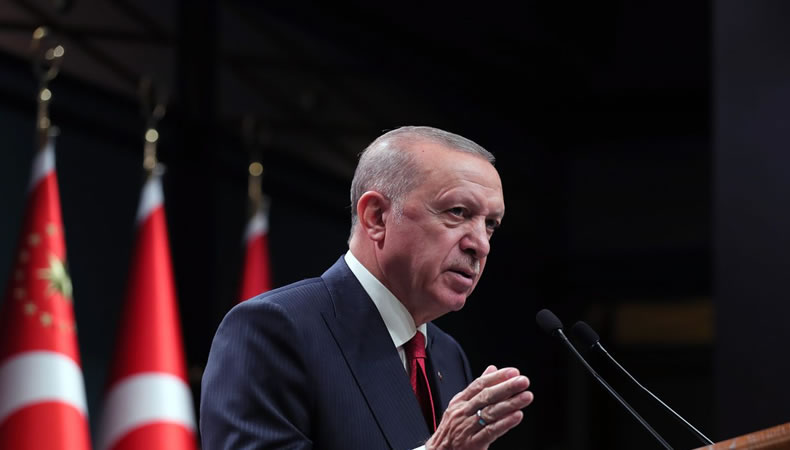Erdogan changes foreign policy in response to economic crisis


After the central bank cut interest rates for the fourth time in a row on December 16, Turkey’s national currency, the lira, maintained its downward trend this week. “With 20 percent inflation and the devaluation of the lira since the start of the year, millions of Turks have been forced into severe poverty.” Mustafa Sonmez said .
On December 17, the day after the rate cut, the lira plunged another 7% forcing Turkey to close its stock exchange. While Turkish citizens struggle with rising prices as a result of currency depreciation, affluent foreigners are reaping the benefits of the weak lira especially those looking for deals in the country’s real estate market, where selling of houses jumped about 50 percent last month, bringing in billions of dollars, according to the Turkish government statistics agency.
Also Read | Breakthrough moment: Can it lead to normalized relations between Turkey and Armenia
Muhdan Saglam stated that “the rise in car prices is not only due to the depreciation of the lira but also to the excessive taxes that Ankara imposes on cars. VAT at 18 percent and a special consumption tax that varies according to the base price of the car and the size of the engine where the total taxes often exceed the base price of the car.” Turkish cars became less expensive in the export market due to weak lira which increased number of sales.
Saglam added that “Turkey’s auto sector which is home to the factories of major brands such as Renault, Fiat, Toyota and Hyundai , remains the country’s largest exporter and ranks among the world’s top 15 auto centers with exports totaling $25.5 billion. 2020, according to the State Department’s Automobile Exporters Association. ” Turkish Foreign Minister Mevlut Cavusoglu declared this week that, despite the economic crisis, Turkey will normalize relations with Armenia and resume charter flights between Istanbul and Yerevan.
However,Turkey’s refusal to recognize the Ottoman Armenian genocide in 1915, Turkey’s backing for Azerbaijan in the Nagorno-Karabakh War, and the Russian-Turkish battle for dominance in Central Asia all impede the path to normalization.
In September 2008, Abdullah Gul became the first Turkish head of state to visit Armenia, resulting in a mild improvement in relations. In 2009, Armenia signed normalization agreements, but ties immediately deteriorated. Turkey is informed that US President Joe Biden, the first US president to do so, would recognize the Armenian Genocide in an April 2021 statement.
The agreement signed by Russia, Armenia, and Azerbaijan in November 2020 that ended the Nagorno-Karabakh conflict provides the main impetus for the move, according to Candar. Azerbaijan, supported by Turkey, recovered all Nagorno-Karabakh lands lost to Armenia in 1993 last October.
Candar explains that the deal was more than just a truce; “it was a pact that intended to determine the region’s future.” “The deal’s final clause asks for the construction of a corridor connecting Azerbaijan’s mainland with its autonomous exclave of Nakhichevan on the Turkish border,” Candar says. “Such a corridor would directly connect Turkey to Azerbaijan on the western side of the Caspian Sea, and from there to other Turkic states in Central Asia, fulfilling a decades-old shared Turkish-Azeri desire.” The construction of corridors and roads connecting regional countries is also beneficial to China’s grandiose Belt and Road Initiative.”
“The jury is still out on whether Ankara or Moscow won the war over Nagorno-Karabakh, or if it was just the latest iteration of their so-called “competitive cooperation,” in which the two sides manage their differences in places like Syria and Libya while pursuing their common interests,” Amberin Zaman adds.
“However, Russia retains leverage on both sides with its ‘peacekeepers,’ and has no intention of relinquishing it.” Saudi Arabia, the United Arab Emirates, Bahrain, and Egypt lifted their three-year embargo on Qatar in January 2020, resuming normal economic and security relations within the Gulf Cooperation Council and the Arab League.
Turkey and Qatar have maintained tight ties, and the Gulf reconciliation has enabled Turkey to begin a new chapter in its relations with the United Arab Emirates and Saudi Arabia. Since 2011, when Turkey sponsored the Muslim Brotherhood and other Islamist parties during the Arab Spring, Ankara has had tense relations with both Gulf governments.
The Brotherhood, which came to power in Egypt through elections in 2011-2012 and was toppled by a military coup in 2013, is considered a terrorist group by the UAE. Erdogan condemned the United Arab Emirates for supporting Turkey’s failed coup attempt in 2016. But that’s all about to change. During an ice-breaker visit to Ankara in November, Abu Dhabi Crown Prince Mohammed bin Zayed Al Nahyan offered $10 billion in investments in Turkey.
The UAE “appears to be interested in Turkey’s defense industry,” writes Fehim Tastekin, “which has recently gained international attention due to the influence that the Bayraktar TB2 drones have had in various conflicts.” “During Erdogan’s visit to Doha on December 6-7, Emirati officials looked at cooperating with Turkish defense industries, notably the largest, Aselsan.”
“Ankara expects that Saudi Arabia will take steps to thaw the ice with Turkey as well, in order to avoid falling behind the UAE in Yemen. Erdogan is eager to perform a U-turn and shake hands with Saudi Crown Prince Mohammed bin Salman, whom Ankara blames for the assassination of journalist Jamal Khashoggi at the Saudi consulate in Istanbul in October 2018 “Tastekin adds.




